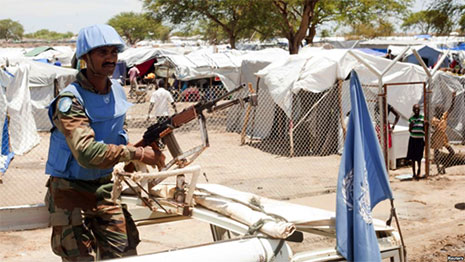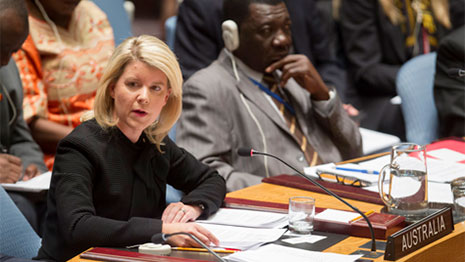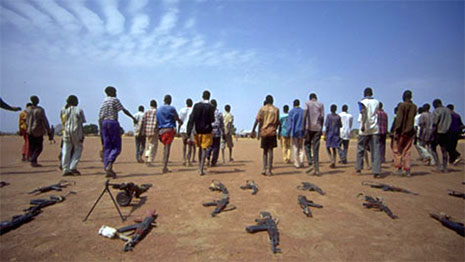Protection of civilians
Enhancing the protection of civilians was the focus of Australia's term on the Council, both by design and by necessity. Our Council term coincided with a period of enormous civilian suffering around the globe. Intense conflicts and protracted humanitarian crises had taken a massive toll on civilians. Over 52 million people worldwide were forcibly displaced by the end of 2014 – the highest number since World War II. And the UN system was struggling to deal with four concurrent Level 3 humanitarian emergencies – in the Central African Republic, Iraq, South Sudan and Syria – as well as the Ebola outbreak in West Africa.
Indeed, the protection of civilians was the guiding principle upon which we based our approach to almost every country-specific situation and thematic issue on the Council's agenda. It was ultimately our desire to enhance protection of civilians which informed our decision to pursue themes – small arms and light weapons, DPRK human rights, Syria humanitarian, counter-terrorism and policing. It featured prominently in our approach to negotiating mandates and engaging in Council consultations on peacekeeping missions; discussions on improving Council working methods, especially those aimed at responding to early warning of conflict; humanitarian access; accountability and combating impunity for human rights violations as well as peacebuilding and security sector reform.
Find out more:
Women, peace and security
The Security Council's work on women, peace and security advanced significantly during Australia's term. Australia consistently promoted these issues across the breadth of the Security Council's mandate, including to ensure women's participation in decision making, their protection from conflict-related sexual violence, and to ensure greater attention on ensuring accountability for perpetrators of sexual violence. To enable effective implementation of the women, peace and security agenda, including the commitments in the new resolutions, Australia consistently promoted the inclusion of gender-specific language in the drafting and renewing of peacekeeping mission mandates, including the new peacekeeping mission in Mali, and the UN political mission in Somalia.
Under Australia's Presidency of the Security Council, in September 2013 and November 2014, Australia also worked to ensure women, peace and security was a key element of these two landmark resolutions adopted by the Council. Resolution 2117–the first ever on small arms and light weapons–was passed a few months after the agreement to the Arms Trade Treaty. It recognised the impact of small arms and light weapons on civilians, particularly women and children. It emphasises the importance of women's full participation in combating the illicit transfer, accumulation and misuse of small arms. Resolution 2185–another first–secured the role of police in peacekeeping and post-conflict peacebuilding. Drawing on Australia's experience in gender-responsive policing in Solomon Islands, Timor-Leste and Vanuatu, Resolution 2185 emphasised the importance of women's participation in policing and peacekeeping, reinforced the critical role of police in preventing and responding to sexual violence (including for evidence collection and accountability for perpetrators) and urged more women to be deployed as UN police in peacekeeping missions.
During its term, Australia took the lead in the drafting of Security Council resolutions relating to Afghanistan, ensuring a priority focus on human rights, especially for women and girls. Embedding the women, peace and security agenda across the breadth of the Security Council's work has included building understanding among its decision makers on the varied and critical roles of gender practitioners in the field. In support of this, Australia and Guatemala co-hosted an Arria-formula meeting of the Security Council in May 2013 on the role of gender advisers in peacekeeping operations. This provided Security Council members, UN Peacebuilding Commission members, UN Member States and key civil society actors the opportunity to hear from gender advisers, women protection advisers and UN police who were working on sexual violence crimes and deployed in peacekeeping missions, on the practical challenges of implementing the women, peace and security agenda on the ground.
Australia has also worked to build broader acceptance and support among key decision makers on women, peace and security issues. Activities included:
- co-hosting a forum with Rwanda, in the lead-up to the Council's adoption of Resolution 2122, on the critical importance of women's participation in peacebuilding, featuring women peace leaders and the head of the UN Peacebuilding Commission (September 2013)
- hosting an event at the 58th Session of the Commission on the Status of Women on best practices in implementing Security Council Resolution 2122, featuring women involved in evolving peace processes in Colombia, South Sudan and Syria (March 2014)
- co-hosting an event with Rwanda, during the lead-up to the Global Summit to End Sexual Violence in Conflict, on the role of UN police peacekeepers in addressing conflict-related sexual violence (June 2014)
- co-hosting a forum with Rwanda, ahead of the Security Council's annual open debate on women peace and security, on the role of national militaries in supporting gender-responsive peacebuilding, showcasing the innovative approaches of the Australian Defence Force and Australian Federal Police in attracting, recruiting, retaining and promoting female officers (October 2014).
The women, peace and security agenda continues to be a priority for Australia's UN engagement. Australia will participate in key UN processes in 2015, including the High Level Review and Global Study on Resolution 1325, reviews of peace operations and peacebuilding architecture, the 20-year review of the implementation of the Beijing Platform for Action, and the negotiation of a post-2015 development framework.
Find out more:
Children and armed conflict
Children are among the most vulnerable in areas of conflict. The UN estimates that there are over 1 billion children living in countries affected by conflict, including 300 million under 5 years old (UN estimates). Many children are among the civilian casualties of war. Children are often recruited by armed groups, as combatants or intelligence sources, or for sexual exploitation and forced labour. Moreover, boys and girls are frequently victims of landmines and other unexploded ordnances.
Australia has long been actively engaged in the issue of children and armed conflict. In 2008, Australia endorsed the Paris Principles, it is a long-standing and active member of the Friends of Children and Armed Conflict group in New York and contributes financially to address the issue, most notably partnering with UNICEF in its work reintegrating former child soldiers in the Philippines and Myanmar.
We engaged closely with the Security Council Working Group on Children and Armed Conflict, paying particular attention to advocacy on ending recruitment of children by government forces and by non-state armed groups; addressing the military use of schools; and ensuring accountability for those who violate child rights during conflict. The Working Group adopted seven sets of conclusions during our term, covering the Lord's Resistance Army and children affected by conflict in DRC, Mali, Myanmar, the Philippines, Syria and Yemen. The conclusions on Syria sent a strong message of condemnation for violations and abuses committed against children in Syria and demanded that the Syrian Government and all parties to the conflict, immediately cease these violations.
At the end of our Council term, substantial progress had been made on the child protection agenda. Key institutional processes were in place to protect children during conflict, such as the deployment of child protection advisors in peacekeeping missions; the signing of action plans to halt the recruitment of children and the campaign to have no children in government forces by 2016. Despite these efforts, children continue to be recruited and continue to suffer disproportionately in conflict.
Find out more:




